Thousands party at Budapest Pride in clear message to Orban
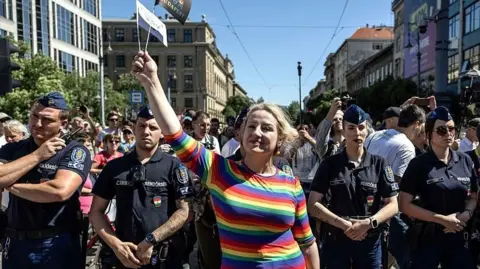 Getty Images
Getty ImagesBudapest advertises itself as a party town. On Saturday, the party spilled out onto the streets, and occupied, in the scorching heat of summer, the Elizabeth Bridge and the river banks and downtown areas on both shores of the Danube.
Between 100,000 and 200,000 mostly young people danced and sang their way from Pest to Buda.
A distance that usually takes only 20 minutes on foot stretched to three hours.
Prime Minister Viktor Orban's ban, many Budapest Pride participants told me, spurred them to attend an event they usually stay away from. Last year, just 35,000 took part.
Many banners mocked the Hungarian prime minister. It was like a peaceful revenge by some of those he has declared war on during his past 15 years in power.
"In my history class, I learnt enough, to recognise a dictatorship. You don't need to illustrate it - Vik!" read one hand-made banner. "I'm so bored of Fascism," read another.
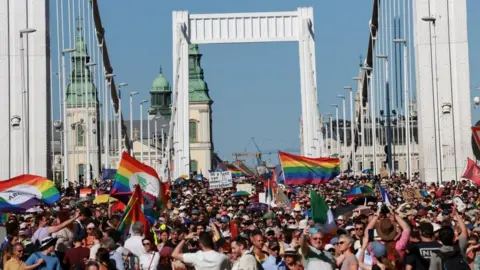 Reuters
ReutersT-shirts with Orban's image, in bright eyeshadow and lipstick, were everywhere.
While the LGBT community with its vivid paraphernalia made up the core of the march, this year's Pride turned into a celebration of human rights and solidarity.
"We don't exactly look as though we were banned!" a beaming Budapest mayor, Gergely Karacsony, told the crowd, in a speech in front of the Budapest Technical University.
Saturday's march could go down as the crowning moment of his political career. A city hall starved of funds and in constant struggle with the central government dared to host an event the government tried to ban, and won - for now at least.
"In fact, we look like we're peacefully and freely performing a big, fat show to a puffed-up and hateful power. The message is clear: they have no power over us!" Karacsony continued.
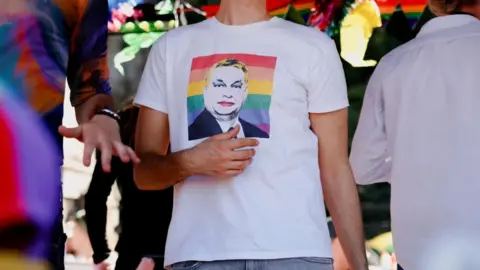 Reuters
ReutersAmong the attendees was Finnish MEP Li Andersson, who felt Orban was using arguments on family values as a pretext to ban the march.
"It's important to emphasise that the reason why we are here is not only Pride - this is about the fundamental rights of all of us," she said.
The ban was based on a new law, passed by the big majority held by Orban's Fidesz party in parliament, subordinating the freedom of assembly to a 2021 Child Protection law that equated homosexuality with paedophilia, and therefore banned the portrayal or promotion of homosexuality in places where children might see it.
The police justified a ban on Saturday's march on the grounds children might witness it. In response, the mayor cited a 2001 law stating events organised by councils do not fall under the right of assembly.
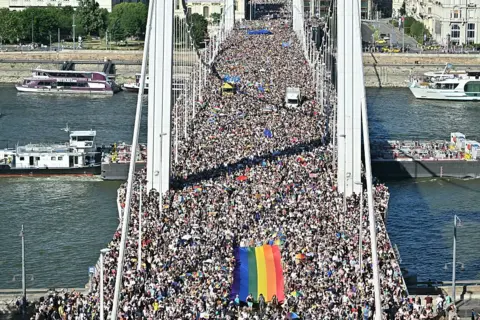 Getty Images
Getty ImagesIn the end, the police officers present at the march kept a discreet presence, looking on mournfully at a party from which they were excluded.
In another part of the city, Orban attended the graduation ceremony of 162 new police and customs officers, and new officials of the National Directorate-General for Policing Aliens.
"Order does not come into being by itself, it must be created, because without it civilised life will be lost," Orban told the students and their families.
Earlier, he and other prominent Fidesz officials posted pictures of themselves with their children and grandchildren, in an attempt to reclaim the "pride" word.
"Post a picture, to show them what we're proud of," Alexandra Szentkiralyi, the head of the Fidesz faction in the Budapest Council, posted on Facebook, alongside a picture of herself in a rather plain "Hungary" T-shirt.
The police presence was restrained in Budapest on Saturday, but temporary cameras installed ahead of the march and mounted on police vehicles recorded the whole event.
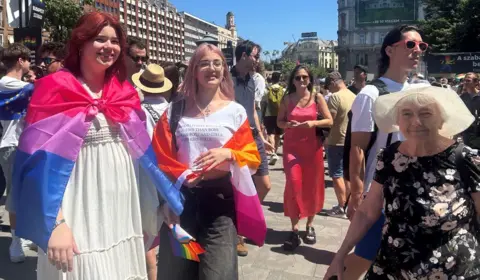 Nick Thorpe, BBC
Nick Thorpe, BBCThe 18 March law that attempted to ban the Pride gave the police new powers to use facial recognition software. Fines of between £14 ($19) and £430 could be imposed on participants.
The pro-government media was scathing in its criticism of the day's events, echoing remarks by leading Fidesz politicians that the march was a celebration of perversity, with nothing to do with freedom of assembly.
"Chaos at Budapest Pride," proclaimed Magyar Nemzet, the government flagship.
"The notorious climate activist and more recently terrorist supporter Greta Thunberg posted on her Instagram page that she is also at Budapest Pride," it continued.
"After the demonstration, this will be a question for the courts," Zoltan Kiszelly, a political analyst close to the government, told the BBC.
"If the courts decide in favour of the mayor and the (Pride) organisers, then Orban can say, okay, we have to change the legislation again."
If the courts decide for the government, however, the prime minister can be pleased with the law he pushed through - despite the fact Pride went ahead.
